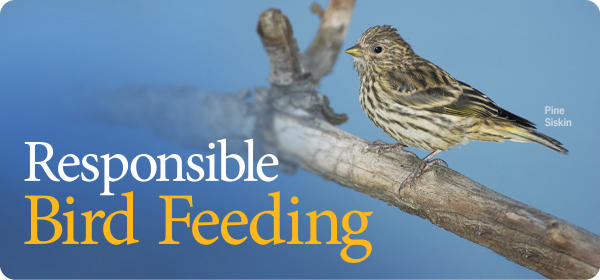If you enjoy feeding and watching your backyard birds, then you probably want to do as much as you can to practice your hobby safely and ensure the birds’ overall health and well-being. While the incidence of birds falling ill from feeders is small compared to other natural hazards birds face, there are things you can do to help your birds stay healthy.
-
Provide seed from a bird feeder rather than scattering it on the ground.
-
Keep areas clean under and around your feeders.
-
Keep fresh seed in the feeder and be sure it doesn’t get moldy; Always discard any seed that has become wet, moldy or foul smelling.
-
Clean your bird feeders regularly with a solution of one part bleach and nine parts water.
-
Give the birds more space; If using multiple feeders, place the feeders farther apart from one another. This will reduce crowding, lower stress and lessen the potential for disease transmission between sick and healthy birds.
-
Limit the amount of seed you provide.
-
Offer only as much food as the birds will eat in one or two days.
-
Store all bird seed in rodent- and insect-proof containers to avoid contamination.
The following strategies will help improve the health and safety of birds when the spread of avian diseases is a concern:
-
If feeder birds are exhibiting disease symptoms, then remove all feeders so local birds can disperse and utilize natural food sources.
-
Clean and sanitize all bird feeders, bird baths and hardware with a 10% bleach (one part bleach to nine parts water) solution. Rinse thoroughly and allow to dry completely.
-
Avoid handling sick birds (always use gloves if attempting a rescue to transport to licensed wildlife rehabilitator) and always wash your hands with soap and water after filling bird feeders.
-
Leave feeders down for at least two weeks
-
Rake up and discard seed debris and bird droppings from the ground below and around feeders. Continue to clean these areas on a regular basis.
-
Only use feeders that can be easily cleaned. Replace wooden feeders with ones made of plastic or recycled materials for easier cleaning.
-
Bird feeders with cracks and crevices are difficult to sanitize and should be avoided.
-
Remove open tray and platform feeders that allow fecal material and food to come into contact with each other.
-
Use antimicrobial bird feeders such as Wild Birds Unlimited EcoClean® Feeders. These feeders have built-in antimicrobial product protection on the treated surfaces.
If finch populations are involved:
-
Initially reintroduce foods and feeders that will not attract finches (suet, safflower, peanuts, hummingbird feeders, etc.)
-
Reinstall finch feeders and food after an additional two weeks.


